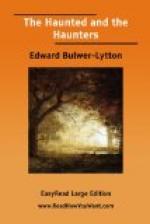Mark Sharp, he slew me on such a moor,” naming
one that Graeme knew, “with a collier’s
pick, threw my body into a coal-pit, and hid the pick
under the bank; and his shoes and stockings, which
were covered with blood, he left in a stream.”
The apparition proceeded to tell Graeme that he must
give information of this to the nearest justice of
peace, and that till this was done, he must look to
be continually haunted. Graeme went home very
sad; he dared not bring such a charge against a man
of so unimpeachable a character as Walker; and yet
he as little dared to incur the anger of the spirit
that had appeared to him. So, as all weak minds
will do, he went on procrastinating; only he took
care to leave his mill early, and while in it never
to be alone. Notwithstanding this caution on his
part, one night, just as it began to be dark, the
apparition met him again in a more terrible shape,
and with every circumstance of indignation. Yet
he did not even then fulfil its injunction; till on
St Thomas’s eve, as he was walking in his garden
just after sunset, it threatened him so effectually
that in the morning he went to a magistrate and revealed
the whole thing. The place was examined; the
body and the pickaxe found; and a warrant was granted
against Walker and Sharp. They were, however,
admitted to bail; but in August, 1681, their trial
came on before Judge Davenport at Durham. Meanwhile
the whole circumstances were known over all the north
of England, and the greatest interest was excited by
the case. Against Sharp the fact was strong,
that his shoes and stockings, covered with blood,
were found in the place where the murder had been
committed; but against Walker, except the account received
from the ghost, there seemed not a shadow of evidence.
Nevertheless the judge summed up strongly against
the prisoners, the jury found them guilty, and the
judge pronounced sentence upon them that night, a thing
which was unknown in Durham, either before or after.
The prisoners were executed, and both died professing
their innocence to the last. Judge Davenport
was much agitated during the trial; and it was believed,
says the historian, that the spirit had also appeared
to him, as if to supply in his mind the want of legal
evidence. This case is certainly a solemn illustration
of the mal-administration of justice in an ancient
court; yet the circumstantial evidence, arising from
the appearance of the spirit, appears very strong—the
finding of the body, and the boots and stockings.
Yet we need perhaps to live more immediately within
the circle of the circumstance to pronounce upon it.
None of us, however, reading this book, would like
to take upon ourselves the responsibility of those
daring jurymen, who durst venture to throw away life
upon evidence which, strong as it appears to have
been, did not come to them, but only to one who had
borne witness to them.
XLIX
THE HAND OF GLORY




